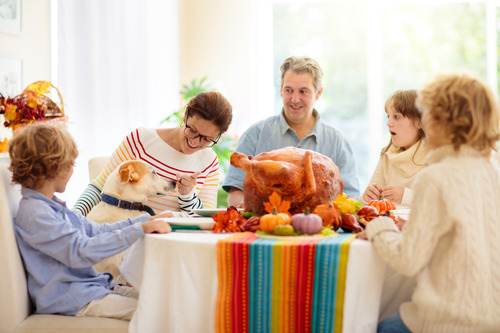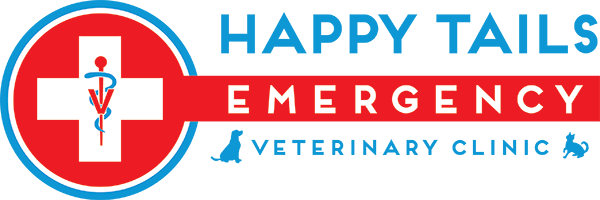What to Do If Your Dog Ate a Turkey Bone

When you’re preparing a holiday feast or enjoying leftovers, it’s easy to overlook how tempting turkey bones can be for a curious dog. In just a moment, your pet might snatch a bone from the table or trash, leaving you wondering what to do next. Turkey bones, while seemingly harmless, can create serious risks for your dog’s health, including choking, blockages, or internal injuries. Acting quickly and knowing when to seek veterinary care ensures your pet receives the necessary care they require. If your dog ate a turkey bone, contact Happy Tails Emergency Veterinary Clinic in Greensboro at (336) 288-2688 for immediate guidance.
Why Are Turkey Bones Are Dangerous to Dogs
Turkey bones, like other poultry bones, are small and brittle. When chewed, they can break into sharp fragments that pose several risks to your dog’s health. These bones can:
- Splinter and puncture: Sharp edges may puncture the mouth, throat, stomach, or intestines, leading to serious complications.
- Cause choking: A bone fragment can become lodged in the airway, creating an immediate emergency.
- Lead to blockages: Larger pieces can block the digestive tract, which may require surgical intervention.
- Create internal injuries: Ingesting turkey bones can cause lacerations inside the digestive system, potentially leading to internal bleeding or infection.
Immediate Steps to Take
If you discover that your dog ate a turkey bone, your actions in the first few minutes are crucial. Here’s what you should do:
Assess Your Dog’s Behavior
Observe your dog closely for any signs of discomfort, choking, or distress. These may include coughing, gagging, pawing at the mouth, or drooling excessively. If your dog is struggling to breathe or appears in immediate danger, contact an emergency vet right away.
Avoid Inducing Vomiting
While it might seem logical to make your dog vomit, this can actually cause more harm. Sharp bone fragments can damage the esophagus on the way back up. Always consult your veterinarian before attempting to induce vomiting.
Contact Your Veterinarian
Call your veterinarian or an emergency clinic, such as Happy Tails Emergency Veterinary Clinic in Greensboro, at (336) 288-2688. Share details about what happened, including the approximate size of the bone and how long ago your dog consumed it.
Provide a Calm Environment
Keep your dog calm and monitor them closely. Stress or physical activity can exacerbate potential injuries or blockages.
Signs Your Dog May Be in Trouble
Sometimes, dogs may appear fine initially after eating a turkey bone, only to develop symptoms later. Knowing what to watch for can help you seek timely care. Symptoms of complications include:
- Vomiting or retching
- Loss of appetite
- Diarrhea or constipation
- Blood in the stool or vomit
- Abdominal pain (your dog may whimper or resist being touched)
- Lethargy or unusual behavior
If you notice any of these signs, seek veterinary attention immediately. These symptoms may indicate an obstruction, perforation, or internal injury.
What Happens at the Vet
When you visit your veterinarian, they will likely start with an examination and diagnostic tests to determine whether the bone has caused any damage.
Diagnostic Imaging
X-rays or ultrasounds may be used to locate the bone and assess whether it’s causing any blockages or injuries.
Addressing Turkey Bone Ingestion
Treatment will depend on the situation:
- Monitoring: If the bone appears to be moving through the digestive system without issues, the vet may suggest monitoring your dog for any changes.
- Endoscopy: In some cases, the bone can be retrieved using a specialized tool without surgery.
- Surgery: If the bone has caused a blockage or perforation, surgical intervention may be required to remove it and repair any damage.
Tips for Preventing Future Turkey Bone Incidents
To avoid future emergencies involving turkey bones or other dangerous items, consider these preventive measures:
- Ensure that all turkey bones are thrown away in a sealed trash can that your dog cannot access.
- Keep your dog out of the kitchen or dining area while you prepare and serve food.
- Offer your dog vet-approved chew toys or treats designed for their size and chewing habits.
- If you have visitors, inform them not to feed your dog table scraps, especially bones.
When to Call Happy Tails Emergency Veterinary Clinic
If your dog ate a turkey bone, seek professional advice as soon as possible. Whether your dog is showing symptoms or you’re unsure about the severity of the situation, contacting your vet is the best way to safeguard their health. At Happy Tails Emergency Veterinary Clinic in Greensboro, North Carolina, our team can provide guidance and care when you need it most. Call us at (336) 288-2688 for expert assistance.
Taking Steps for a Safer Holiday Season
Protecting your dog from the potential dangers of turkey bones starts with swift action and informed decisions. If your dog has eaten a turkey bone, don’t wait for symptoms to develop—reach out to the trusted team at Happy Tails Emergency Veterinary Clinic in Greensboro, North Carolina. Our compassionate professionals are available to assess your dog’s needs and provide the care they deserve. Call us at (336) 288-2688 for assistance or visit us to ensure your pet gets the expert attention they need.
Recent Posts
About Us
At Happy Tails Veterinary Emergency Clinic in Greensboro, NC, our kind and knowledgeable team is available to provide gold standard emergency vet care for you and your pet. We’re available in the late night and early morning hours during the week, and 24/7 on weekends for your convenience.
